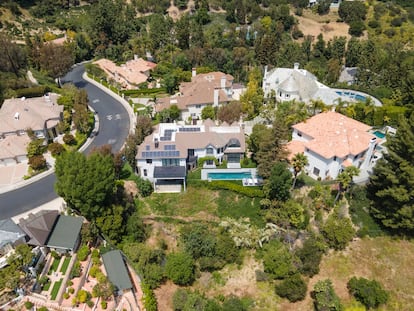The rich on the run in Los Angeles: Dodging a mansion tax that benefits the homeless
Californian millionaires are looking for ways to dodge the new levy on luxury homes, which enables social housing construction


The first few months of 2023 have been an excellent time to unload a mansion in Los Angeles. A proposed tax to help build low-income housing has prompted the sale of dozens of luxury residences. The so-called “mansion tax” was approved in a referendum last fall and came into effect in April. The tax is levied at 4% on all sales of residences worth more than $5 million, and this generated about $200,000 earmarked to address the pressing problem of homelessness in the city. The levy is progressive and reaches 5.5% for homes valued at more than $10 million ($550,000). Consequently, the temperature in one of the hottest real estate markets in the United States has gone up several notches.
The tax sparked a frenzy in Los Angeles, a city where mansions are abundant. Homeowners who were uncertain whether to sell found the perfect excuse in this measure, proposed by city planners. During March, the local press was abuzz with stories about the schemes resorted to by millionaires to sell their properties as quickly as possible. The owner of a luxury residence in Beverly Crest, in the municipality of Santa Monica, offered to throw in one of the vehicles that appeared in the photos of the mansion, which he was selling for $16.5 million. The cars were a McLaren, an Aston Martin or a Bentley. The celebrities who decided to get rid of their homes to avoid paying this tax include the likes of Jim Carrey, Mark Wahlberg, Jennifer Lopez and TV host James Corden.
Between January and March, the real estate market was rife with creativity. Various schemes were devised to sidestep the tax, which was intended to provide an added lever for Los Angeles County to solve homelessness problems for an estimated 50,000 people. Some owners opted for rebates only valid in March, others chose to divide their assets so that the value would not amount to $5 million. Some of them went to law firms to take the city to court because of a tax that they believe is unconstitutional.
However, the bubble has burst. “We had an extraordinary March, so many high value properties were sold in that month, but the trend is now declining,” Mauricio Umansky, president of The Agency, a boutique real estate agency for millionaires, said recently. In March, some 126 property transactions in excess of $5 million were finalized. By contrast, in April there were only two.
The sale of these two properties, in the Venice and Brentwood areas, the neighborhood where Lakers star LeBron James resides, accumulated $528,000 in tax dollars for the House LA program (homelessness prevention and affordable housing fund). These resources can now be allocated by the city to prevention programs. Nevertheless, the figure is a far cry from what the three urban planners who collected the signatures had expected. The initial estimate was to hit $900 million, an amount they calculated by tracking market activity between 2021 and 2022. The Los Angeles experiment is the most aggressive of its kind. Another city with a substantial homeless population, New York, has a similar tax. This stands at 1% for each property valued at more than $1 million. These taxes, incurred by sellers, are on top of other charges such as the property tax, which is 0.82% in Los Angeles County.
Sign up for our weekly newsletter to get more English-language news coverage from EL PAÍS USA Edition
Tu suscripción se está usando en otro dispositivo
¿Quieres añadir otro usuario a tu suscripción?
Si continúas leyendo en este dispositivo, no se podrá leer en el otro.
FlechaTu suscripción se está usando en otro dispositivo y solo puedes acceder a EL PAÍS desde un dispositivo a la vez.
Si quieres compartir tu cuenta, cambia tu suscripción a la modalidad Premium, así podrás añadir otro usuario. Cada uno accederá con su propia cuenta de email, lo que os permitirá personalizar vuestra experiencia en EL PAÍS.
¿Tienes una suscripción de empresa? Accede aquí para contratar más cuentas.
En el caso de no saber quién está usando tu cuenta, te recomendamos cambiar tu contraseña aquí.
Si decides continuar compartiendo tu cuenta, este mensaje se mostrará en tu dispositivo y en el de la otra persona que está usando tu cuenta de forma indefinida, afectando a tu experiencia de lectura. Puedes consultar aquí los términos y condiciones de la suscripción digital.








































